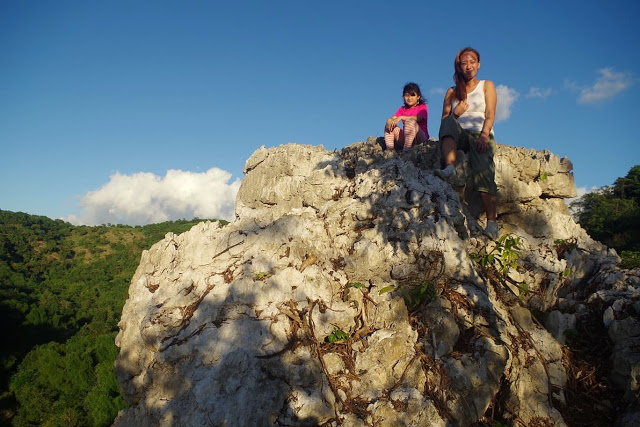The air in our subdivision, located 30 minutes to an hour from bayan, is not quite as frenzied. Locals here live in 45-square meter rowhouse-style homes attached wall to wall and painted in the same colors that make them indistinguishable from one another. Our neighborhood spans three subdivisions, ours being the farthest from the main road.
Days prove to be quiet and uneventful, punctuated by the barking of dogs when a courier or water delivery man stops by. Most of the men work in offices in Manila on weekdays, while the women tend to the children, not to be seen except when they are bathing their babies in the golden rays of the early morning sun or at sundown when they would congregate for small talk.
There are only a couple of stores within a three-kilometer radius that are open until 1 am. The rest close at 9 to 10 pm. If you required food in the wee hours, you’d have to take a P30 tricycle ride to the nearest 7-11. There were times we paid P400 to make an emergency trip to bayan that should cost P80 at most. Tricycles are also rare after 9 pm. Buses to Manila stop serving the route at 10 pm.
Waltermart and Mi, both compact, two story, and located eight kilometers away, are the only “malls” we have, and they have limited selections, mostly local. If I need specialty items like a camera battery, reef-friendly sunscreen, heat pads – once, even a can of blueberries – I’d have to travel all the way to Marilao, Pampanga, or Quezon City to get them. When visiting, my sister often complains that there’s no food stall here within walking distance post-normal store hours. She’s wrong. There is nothing here within walking distance – at least by Manileña standards.
Everything where Lia and I live is the opposite of where I grew up in Malate. It’s inconvenient, dead-silent, and distinctly provincial – characteristics that I once resented. Not the neighborhood necessarily, but the entire decision of moving away from familiarity. From somewhere I didn’t want to leave at the onset.
***
A dark, middle-aged hawker smiled at me, flashing jewelry made from old coins. “Suki, singkwenta lang,” he coaxed, the few short strands on his scalp swaying back and forth in the wind. His demeanor reminded me of curious mothers in my hometown in Manila, women who saw me from my first wails until I left at 25 for a friend’s house in Makati, clothes haphazardly stuffed in boxes and tote bags.
In hometowns, conversations with neighbors, especially the older ones, turn into somewhat of a book reading experience, only backwards, with them leafing through each phase of your life.
“Your mother said you were…”
“You know when you were five…”
“You seem to be putting on weight. You were skinny before.”
“I remember when you were just 10…”
“You and that girl, whatshername, were bestfriends, weren’t you?”
My mother considered herself an “open book” and that extended to the offspring she bore. She routinely shared insider information, even those that we, children, weren’t comfortable discussing with neighbors.
In Malate, everybody knew everyone. They could dissect your history. Drive a scalpel into scar tissue and reopen wounds again and again.
Every hello extended to 30 minutes. If you’re lucky they would, out of politeness, take out the ugly parts. But some also liked to pick on your wounds to flaunt a false sense of concern. I hurried these talks, so I can retreat to my room, smoke cigarettes, and play Tori Amos’ From The Choirgirl Hotel on loop. The days bobbed swiftly when I was alone. They were long and uneasy when I was outside.
Ironically, when I was offered marriage, I felt conflicted about taking my boxes permanently outside of the city. The first few years were quite difficult. I knew nothing about Bulacan, from roads to friendly acquaintances, to local slang. At times, doubt would peek into my door, my mind wandering to a wooden bungalow on the beach, a log cabin in a dense forest, a small hut in a yolk-colored meadow. Anywhere but here.
But 10 years on, here I am, still a resident of Santa Maria. Somewhere between defiance and getting the hang of it, living here became the preferred normal. Movement became crucial to stillness. If I wanted to grow and see wider and further into the horizon, I have to plant my feet somewhere else and live life on my terms.
The time I spent on my own, away from Malate, added a layer of bravado. Out here, nobody here knows about me, about my life more than I allow them to. I enjoy as much peace as I want inside the house, typing away and making new memories with Lia. We leave for bike rides and hikes and return without unwarranted questions hounding us. We carve our own rules according to what fits our dynamics. There’s infinite space for everything: work, silence, thoughts, new possibilities, walks, the sight of Rizal’s mountains, a bright full moon without annoying wires obstructing its perfect shape.
Moving away from home is like writing a book. You leaf through new pages forwards, not backwards, placing new characters inside them and assigning whether they play minor or major parts. You leave the old wounds in previous pages where they belong and create space for new ones – crying, loving, laughing, and drinking in lessons that fortify your spirit. You start afresh and forge a new past; a future away from the only life you’ve known. It’s scary. But also beautiful. Empowering. Liberating.
Moving out of Manila may be impractical, but goddamn, did it give new meaning to my life. In movement, I learned that familiarity is precious, but the growing that occurs after goodbyes is priceless.


